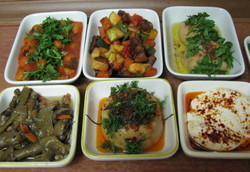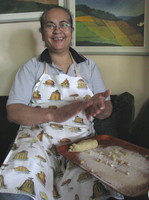Record-breaking hospitality
 After four days of eating our way round Istanbul’s restaurants, markets and street stalls we had intended to fast for a few days.
After four days of eating our way round Istanbul’s restaurants, markets and street stalls we had intended to fast for a few days.
But that was before realising how talented, enthusiastic and generous a cook we were about to find in Zeliha İrez – a Turkish record-setting medium-distance runner turned cook and host extraordinaire…
 Zeliha runs a small guesthouse tucked away in the trees on the slopes high above Lake Sapanca, a few hours east of Istanbul, where we spent a magical couple of days. We marvelled at Zeliha’s phenomenal energy, good humour and culinary know-how while sampling no less than 65 of her home-made dishes and products, and learning the recipes and techniques for at least 20 of them.
Zeliha runs a small guesthouse tucked away in the trees on the slopes high above Lake Sapanca, a few hours east of Istanbul, where we spent a magical couple of days. We marvelled at Zeliha’s phenomenal energy, good humour and culinary know-how while sampling no less than 65 of her home-made dishes and products, and learning the recipes and techniques for at least 20 of them.
Among hundreds of other things, Zeliha makes her own bread, wine, olive oil, cheese, pastrami, jam and molasses, while growing hazelnuts, walnuts, numerous fruits and herbs outside, through which a small gaggle of geese and chickens pick their way each day. She even built her own brick wood-fired oven, which ingeniously heats the guesthouse’s water too.
 Meals made the most of these home-made products and natural ingredients, plus those carefully selected by Zeliha herself from the pazar down in the village, such as purslane, wild artichoke shoots, nettles and hamsi (tiny, anchovy-like fish from the Black Sea). We spent a very happy morning shopping there with Özge and Zeliha, asking “what’s that!?” every five minutes before having some held up to our mouths to try.
Meals made the most of these home-made products and natural ingredients, plus those carefully selected by Zeliha herself from the pazar down in the village, such as purslane, wild artichoke shoots, nettles and hamsi (tiny, anchovy-like fish from the Black Sea). We spent a very happy morning shopping there with Özge and Zeliha, asking “what’s that!?” every five minutes before having some held up to our mouths to try.
Dinners were feasts fit for sultans. Our first night featured 12 freshly made meze, followed by 12-hour slow-roasted tandır-style lamb, finished off with candied pumpkin (kabak tatlısı) and spiral coconut cakes. We’ve rarely been so blown away by a meal.
 From Zeliha we learnt how vegetables such as pumpkin, aubergine and tomato can be candied whilst preserving their raw appearance, colour and texture. It’s not that complicated, but does involve lime (as in the white chalky stuff, not the fruit). Such sweet treats are found in Turkey’s best restaurants and were developed in the labour-intensive Ottoman kitchens of centuries past, from where they spread to Romania and beyond.
From Zeliha we learnt how vegetables such as pumpkin, aubergine and tomato can be candied whilst preserving their raw appearance, colour and texture. It’s not that complicated, but does involve lime (as in the white chalky stuff, not the fruit). Such sweet treats are found in Turkey’s best restaurants and were developed in the labour-intensive Ottoman kitchens of centuries past, from where they spread to Romania and beyond.
 Breakfasts followed suit, with no less than 23 flavours of home-made jam (reçel), fruit paste (marmalat) and molasses (pekmez) – including a particularly delicious carob molasses which must be one of the most divine flavours on earth – 11 cheeses (four of which home-made), cheesy pastries (börek) straight from the oven, sizzling eggs fried with a spicy sausage called sucuk, little cinnamon cookies, fresh cucumber and tomato plus a selection of olives, nuts, dried fruits and ‘pestils’. Such a combination is typical of the Turkish breakfast, but never again were we to see such a phenomenal spread of such high quality.
Breakfasts followed suit, with no less than 23 flavours of home-made jam (reçel), fruit paste (marmalat) and molasses (pekmez) – including a particularly delicious carob molasses which must be one of the most divine flavours on earth – 11 cheeses (four of which home-made), cheesy pastries (börek) straight from the oven, sizzling eggs fried with a spicy sausage called sucuk, little cinnamon cookies, fresh cucumber and tomato plus a selection of olives, nuts, dried fruits and ‘pestils’. Such a combination is typical of the Turkish breakfast, but never again were we to see such a phenomenal spread of such high quality.
 Luckily for me, Zeliha was keen to teach me her recipes and all about the ingredients she uses, however obscure, and her daughter Özge was a phenomenal interpreter, even searching the bookshelves and the internet for names of unusual plants. I was welcomed into the kitchen like a member of the family and spent one afternoon studiously noting Zeliha’s every move and enjoying her occasional cheeky joke and impish grin.
Luckily for me, Zeliha was keen to teach me her recipes and all about the ingredients she uses, however obscure, and her daughter Özge was a phenomenal interpreter, even searching the bookshelves and the internet for names of unusual plants. I was welcomed into the kitchen like a member of the family and spent one afternoon studiously noting Zeliha’s every move and enjoying her occasional cheeky joke and impish grin.
So far I have written up several of her delicious meze recipes: aubergines slow-cooked with olive oil, Armenian wedding balls, broad bean and dill puree, green bean zeytinyağlı and Özge’s boiled egg meze.
 Or alternatively get yourself to Zeliş Farmhouse quick-smart for a gourmet bonanza you won’t forget in a hurry. The only thing that rivals Zeliha’s cooking is the kindness and generosity of the whole family. Without Özge’s attentive and ever-forthcoming translations, we’d have learnt only a fraction of what we did.
Or alternatively get yourself to Zeliş Farmhouse quick-smart for a gourmet bonanza you won’t forget in a hurry. The only thing that rivals Zeliha’s cooking is the kindness and generosity of the whole family. Without Özge’s attentive and ever-forthcoming translations, we’d have learnt only a fraction of what we did.
Could this be the best guesthouse in the world? We haven’t finished trying them all yet, but Zeliş Farmhouse is a good front runner.

 Follow
Follow
Comments are closed